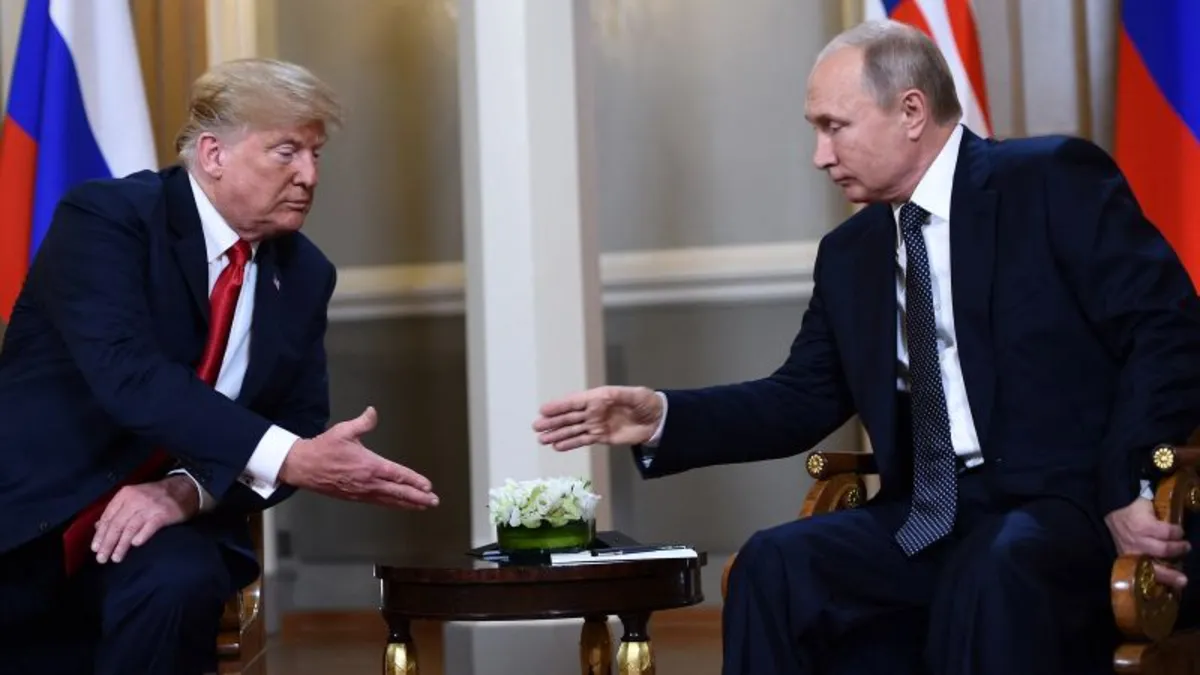
Former President Donald Trump has frequently touted his amicable relationship with Russian President Vladimir Putin. However, as the leaders prepared for their first meeting in six years, Trump began inquiring about the changes in Putin's behavior, revealing a growing sense of frustration. This line of questioning, shared with CNN by multiple sources, highlights Trump's concerns leading up to their summit in Alaska, where they aimed to address Russia's prolonged invasion of Ukraine.
Trump had previously vowed to swiftly negotiate a peace deal even before his presidency began. Despite these intentions, tensions escalated as Putin resisted ceasefire propositions and intensified attacks on Ukraine throughout the year. While some signs suggested a potential shift in Putin's short-term objectives, the overarching sentiment within the U.S. intelligence community remains skeptical. Experts believe that Putin continues to pursue maximalist territorial ambitions and may exploit a ceasefire to regroup his military forces, possibly even launching further offensives against Kyiv.
Despite calls from European leaders for security guarantees for Ukraine, Putin's demands remain unchanged—he seeks to ensure Ukraine never joins NATO and to prevent foreign peacekeepers from entering the region. A source familiar with recent U.S. intelligence assessments remarked, “Putin thinks he is winning, so he has no reason to bend.” This perspective underscores the challenges Trump may face in negotiations.
As Trump seeks to understand Putin better, there are growing fears among Ukrainian and European officials that the White House might be unwittingly playing into the Kremlin's hands. Meeting with Putin on American soil, without Ukrainian President Volodymyr Zelensky present, could be perceived as a victory for Russia. A European official expressed concern, stating, “Russia is offering to stop the war if they get everything they have always wanted, including their most maximalist demands.” This would not represent a genuine agreement but rather a form of submission.
Despite concerns, some European diplomats believe Trump may possess a unique capability to broker a deal, noting his recent policy shifts regarding the war. On the eve of the summit, Trump issued a stern warning that Russia would face “very severe consequences” if he determines that Putin is not serious about ending the conflict. While he did not specify the nature of these consequences, past threats have included the imposition of stricter economic sanctions and tariffs on Russia.
Deciphering Putin's intentions has historically been a formidable challenge for U.S. intelligence. With a background as a KGB officer, Putin maintains a tight-knit circle of advisers, leaving analysts guessing about who influences his decisions at any given time. Despite extensive efforts to understand Putin's behavior, U.S. spy agencies often struggle to grasp the nuances of his day-to-day decision-making. As one official noted, the Kremlin is considered a “hard target,” making traditional espionage methods ineffective.
While the U.S. has occasionally gained insights into Putin's plans—such as the 2022 invasion of Ukraine—it's unclear how much Trump will rely on intelligence briefings ahead of the summit. Concerns have been raised regarding whether his advisers will present the harsh realities of the situation, particularly the prevailing belief that Putin is committed to continuing the war.
Trump has expressed confidence in his ability to quickly assess Putin's intentions, stating he would know within the first few minutes of their meeting whether an agreement could be reached. Reflecting on their past interactions, he remarked, “I got along very well with President Putin,” describing the upcoming summit as a “feel-out” meeting.
However, observers have noted a shift in Trump's perception of Putin, suggesting that European allies believe he has developed a deeper understanding of the Russian leader. A U.S. official indicated that Trump’s initial view of Putin as a positive figure has evolved, now acknowledging the complexities of negotiating with a leader who has shown increasingly aggressive tendencies.
Trump's frustration with Putin began to surface earlier in the summer, as Special Envoy Steve Witkoff echoed similar sentiments about the Kremlin's tactics. Sources revealed that Trump expressed his displeasure with expletives when discussing Putin, indicating a clear change in his stance. As the conflict continues, analysts suggest that Putin's resolve to conquer Ukraine has intensified, making him a more challenging negotiation partner than in previous years.
Despite some indications that Putin may be willing to consolidate territorial gains and focus on economic stability, U.S. intelligence officials have warned that his primary goals remain unchanged. The belief persists that Putin views the war in Ukraine as critical to his regime's survival, with a determination that complicates any potential peace negotiations.
As Trump prepares for his meeting with Putin, both U.S. and European officials remain cautious. The potential for misinterpretation or manipulation by the Kremlin looms large, with Zelensky cautioning that Putin is unlikely to pursue a genuine ceasefire. The meeting could present significant implications for global dynamics, as Trump navigates a landscape fraught with challenges and uncertainties.